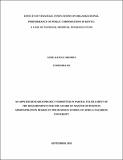Effects of strategic innovations on organizational performance of Public Corporations in Kenya: a case of National Hospital Insurance Fund

View/
Date
2018-09Author
Shompa, Anne Katule
Type
ThesisLanguage
enMetadata
Show full item recordAbstract
Effective public service delivery requires innovation in service provision, improvement on universality, alignment with citizen’s demand as well as full exploitation of the potential of new digital and other technologies. The current study sought to examine the effects of strategic innovations on organizational performance of public service corporations in Kenya. The specific objectives of the study were to examine the influence of strategic innovations namely, breakthrough innovation, disruptive innovation and incremental innovation on organizational performance. The study used National Hospital Insurance Fund as a proxy for public service corporations in Kenya. The study was guided by disruptive innovation theory and blue ocean strategy. Descriptive research design was adopted. Census was applied to select 76 respondents from a target population of 76 workers in three department of NHIF head office in Nairobi Kenya. Questionnaire was used to collect primary data. Drop and pick method was used to distribute questionnaires to the respondents. Pilot study was conducted to test the reliability of the questionnaires using Cronbach’s alpha. Data was cleaned, coded and entered into Statistical Package for Social Sciences (SPSS) then analysed using descriptive statistics; mean standard deviation, frequency and percentages. Inferential statistics such as ANOVA, F-statistic, and correlation and regression analysis was conducted to examine the strength and significance of strategic innovation variables on organizational performance. Analysed data was presented in charts, figures and tables and interpretation provided. Results of the study revealed positive and significant relationship between sustaining, incremental, breakthrough, disruptive innovations and organizational performance in public corporations. On overall 65.9 percent of total variations in organizational performance can be explained by sustaining, breakthrough, disruptive and incremental innovations while the remaining 34.1 percent can be accounted for by other factors not included in the model. The study concluded that measures ought to be deployed to continuously monitor the status of strategic innovation so as to benefit fully from strategic measures deployed by a firm. The researcher concludes that NHIF should continuously embrace strategic innovation on aspects of sustainable, disruptive, break through and incremental innovation. The researcher also recommends that future research should be directed towards validating the results of this study by conducting a similar research in other state-owned corporations to enable cross-sectional comparison of findings. There is also need to adopt alternative research design other than relay on descriptive design.
Publisher
Africa Nazarene University
